Empowering Clinicians
At Oncode, our core mission is to empower clinicians with clear and comprehensive genetic reports of the highest quality. Understanding and effectively using genetic information is essential for clinicians to make informed treatment decisions.
We develop genetic reports that are
with Colour-Guided
Comprehensive
Clear and Concise
We aim to enhance clinicians' ability to navigate and utilize the genetic insights in their clinical practice.
Product Features
Oncode has been a pillar of support for medical professionals and patients alike, delivering exceptional molecular diagnostic services that have proven indispensable in the field. With a well-established track record extending over nearly a decade, Oncode has consistently delivered top-tier services, making a significant contribution to the well-being of countless patients.
Professional Team
Report Visualization
Enhanced Flexibility
Patients' Monitoring
Precision & Accuracy
powerful Data Analysis


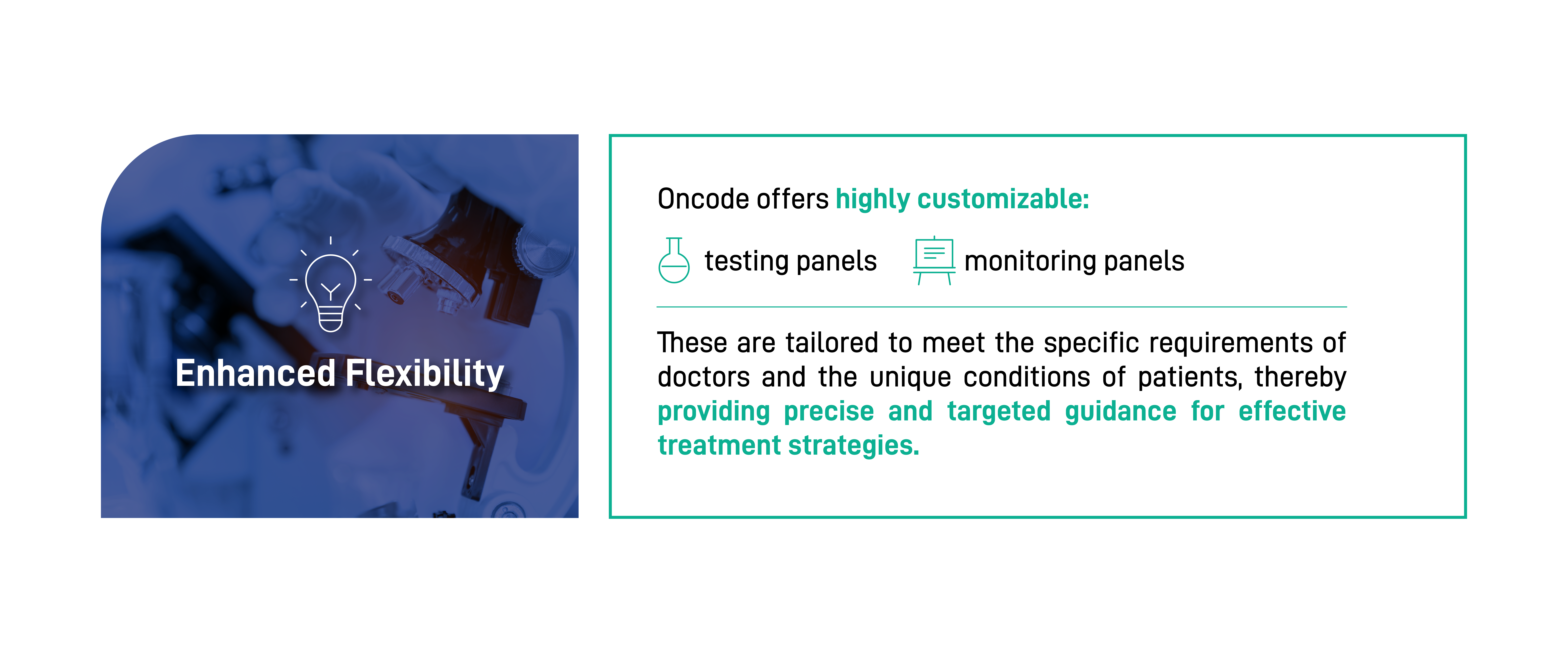

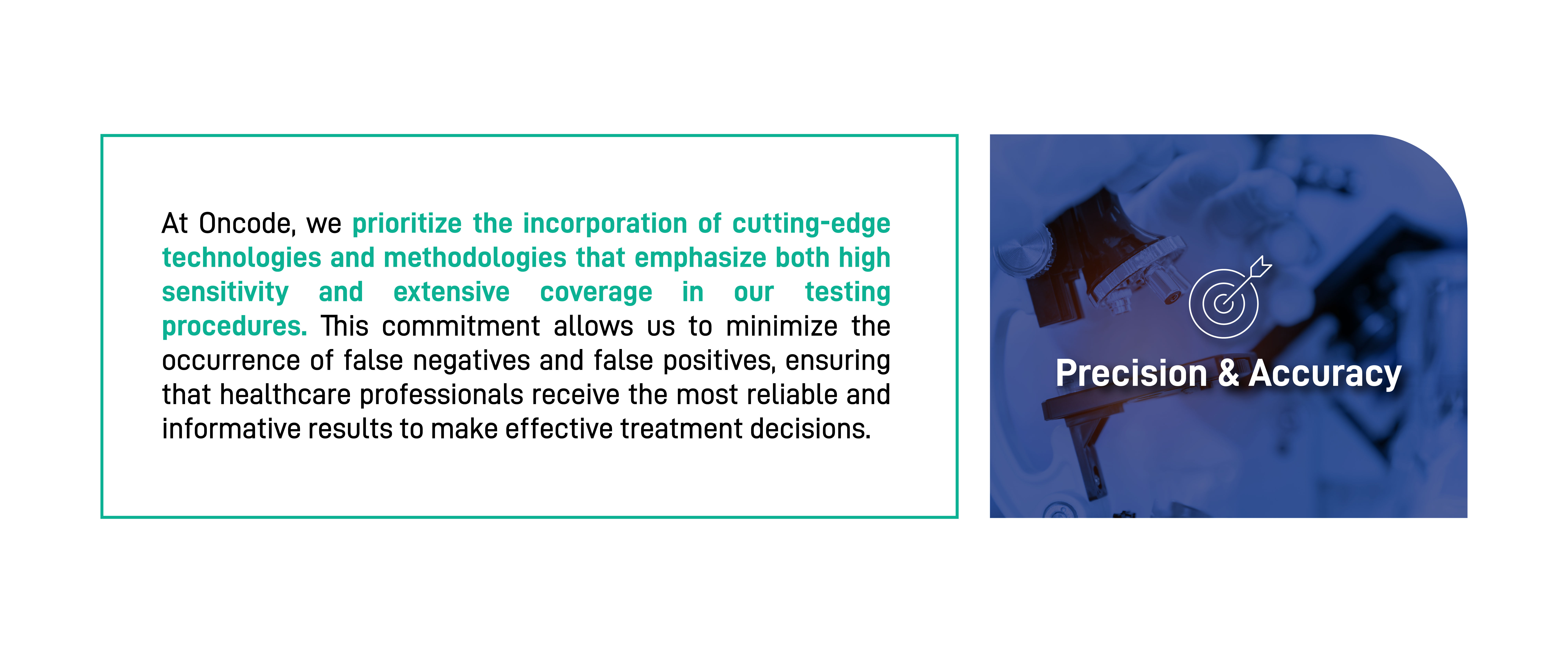

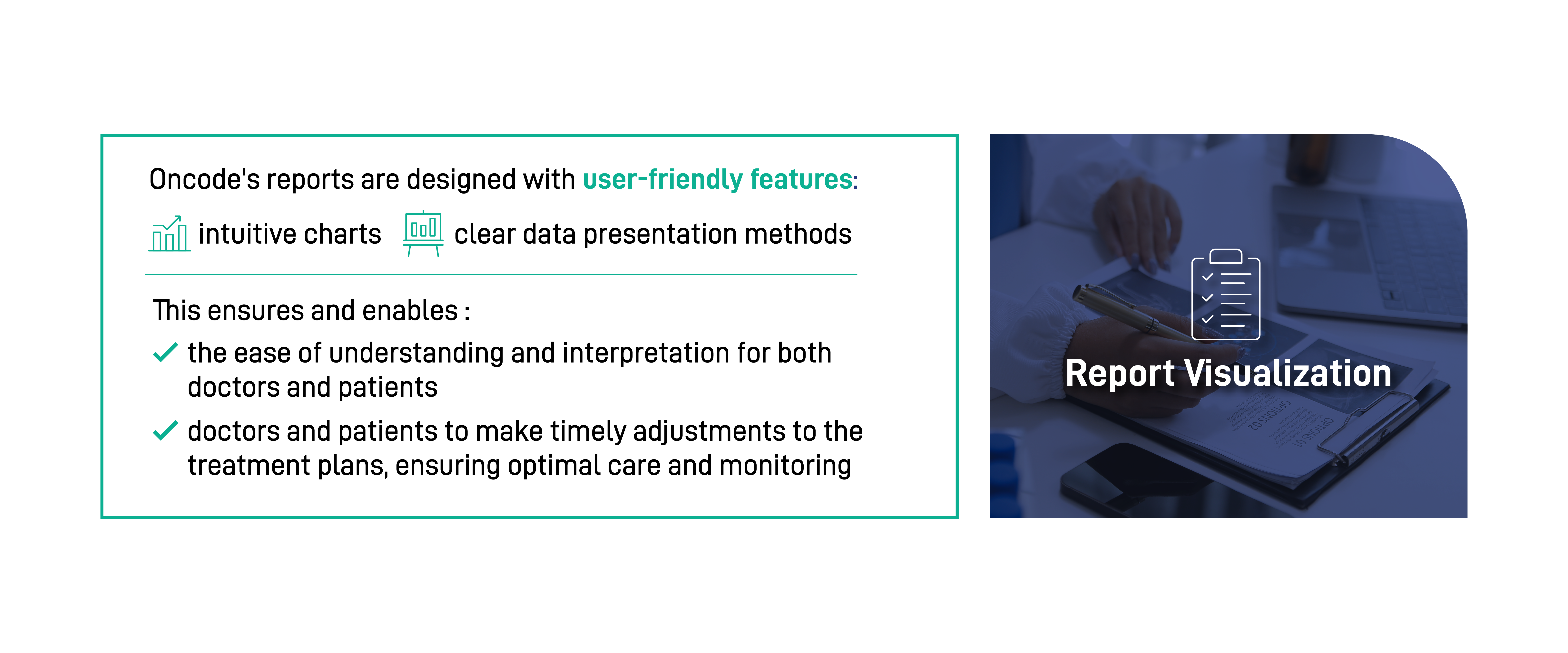

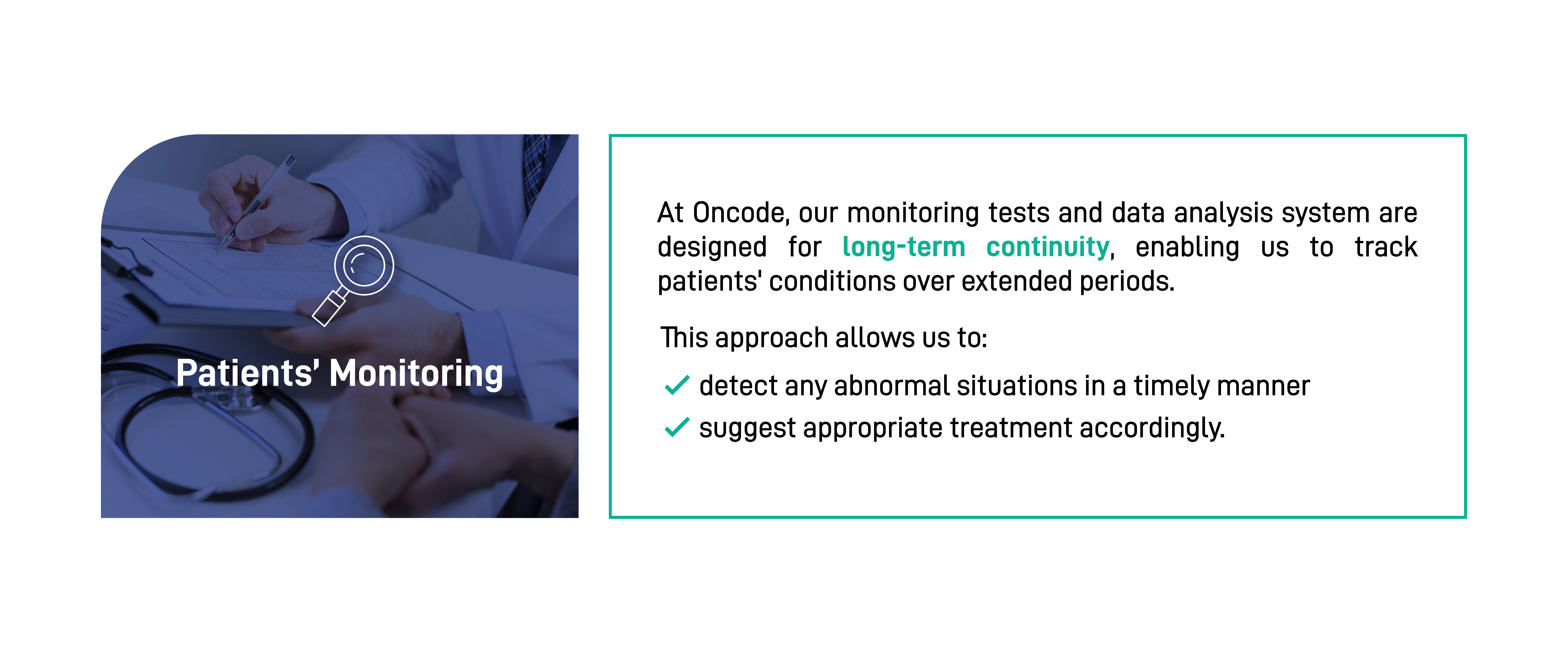

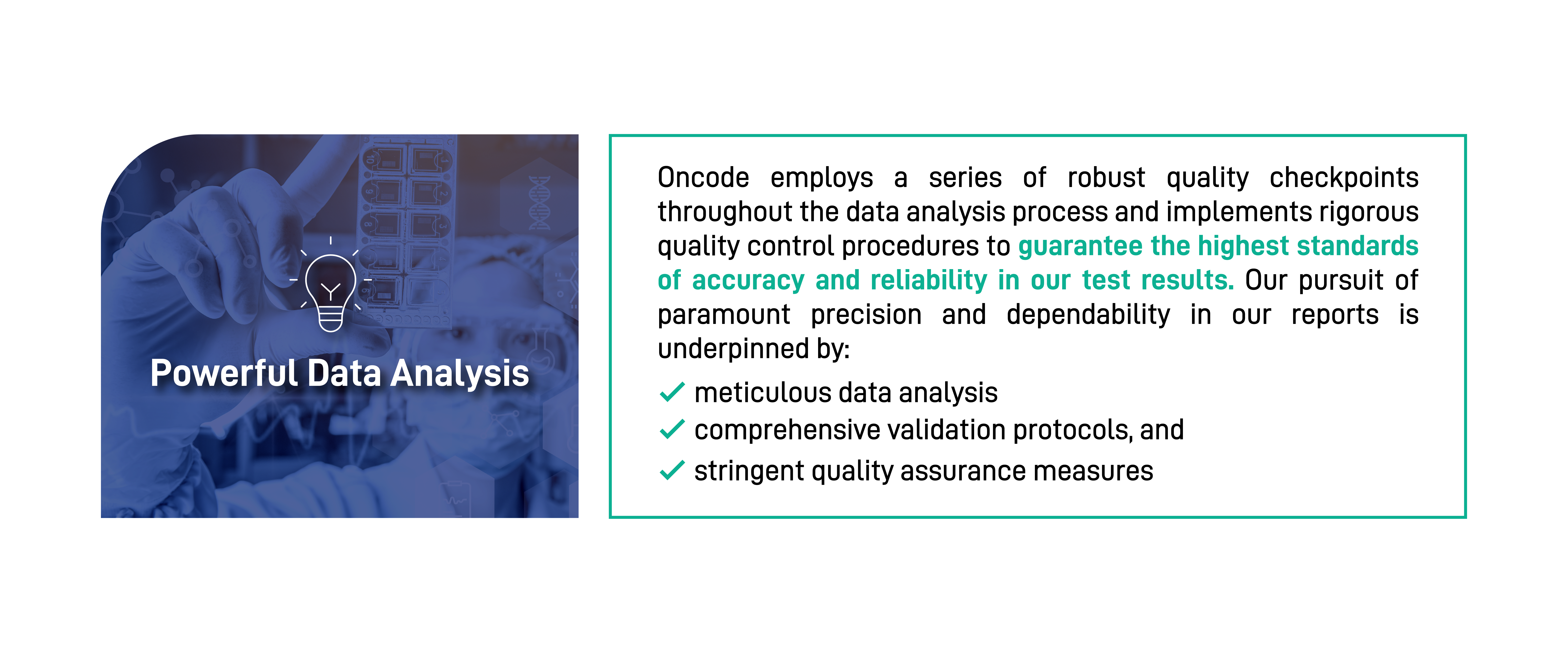

Professional Team
- pathologists
- molecular scientists
- clinical laboratory scientists
- data analysts
Enhanced Flexibility
TESTING PANELS
MONITORING PANELS
These are tailored to meet the specific requirements of doctors and the unique conditions of patients, thereby providing precise and targeted guidance for effective treatment strategies.
Precision & Accuracy
intuitive charts
clear data presentation methods
This ensures and enables:
- The ease of understanding and interpretation for both doctors and patients
- Doctors and patients to make timely adjustments to the treatment plans, ensuring optimal care and monitoring
Report Visulisation
Patients’ Monitoring
- Detect any abnormal situations in a timely manner.
- Suggest appropriate treatment accordingly.
Powerful Data Analysis
- Meticulous data analysis
- Comprehensive validation protocols
- Stringent quality assurance measures


REAL-LIFE ONCODE PATIENT CASE STUDIES
48 Years Old Female, Anaplastic/Poorly Differentiated Thyroid Carcinoma
Considering the rarity of ALK fusion in anaplastic thyroid carcinoma, Oncode team suggested the possibility of the cancer originating from the lungs. Nonetheless, identification of ALK fusion in a non-NSCLC tumor could offer benefits from ALK inhibitors. This new insight influenced the diagnosis. Following targeted drug treatment, the patient experienced significant health improvement and continues to surpass initial expectations in terms of survival.
This case study highlights the power of precision medicine in uncovering the complex nature of cancer and providing more accurate treatment options. By leveraging genomic testing and targeted therapies, the patient’s prognosis drastically changed from a projected two-month life expectancy to over six years (last interview with patient was at early 2023), exemplifying the potential of genetic testing and targeted therapies to transform patients’ outcomes.
REAL-LIFE ONCODE PATIENT CASE STUDIES
54 Years Old Female, NSCLC, Exon 19 deletion
In January 2023, Oncode conducted a liquid biopsy NGS test on the patient’s sample, which showed a positive result for both EGFR and BRAF mutations. The presence of the BRAF gene mutation is known to render EGFR targeted therapy ineffective.
There are two possible explanations for the initial negative BRAF result. Firstly, the initial negative BRAF result could be the emergence of a new mutation, however, the mutation may have been present from the beginning and contributed to the lack of response to the treatment. Secondly, it is believable that the limited sensitivity of the PCR test (typically 95% compared to NGS’s 99.9% LOD) may have resulted in the earlier detection failure of low allele frequency BRAF mutations.
This case highlights the critical importance of testing sensitivity to avoid missed diagnoses or misdiagnoses, thereby ensuring that patients receive appropriate and effective targeted therapies.
REAL-LIFE ONCODE PATIENT CASE STUDIES
37 Years Old, Female, Advanced Colorectal Cancer, Peritoneal Metastasis, Refractory
In light of this, the doctor decided to pursue a liquid biopsy NGS test with Oncode. The test revealed a positive KRAS gene mutation with a mutant allele frequency of 0.7%, which is below the limit of detection (LOD) for most PCR and some NGS tests.
It is well-established that colorectal cancer with KRAS mutations should not be treated with cetuximab or panitumumab due to the activation of alternate signaling pathways and/or structural changes in the EGFR protein.
This case underscores the importance of sufficient sensitivity in detection methods. Insufficient sensitivity may lead to false-negative results, resulting in misdiagnosis or delayed treatment.
REAL-LIFE ONCODE PATIENT CASE STUDIES
56 Years Old Female, NSCLC with EGFR L858R
REAL-LIFE ONCODE PATIENT CASE STUDIES
35 Years Old Male, NSCLC Primary, Failed Osimertinib
It is noteworthy that both the T790M and C797S variants were detected in the same allele in a cis configuration, indicating resistance to all EGFR-TKIs.
In T790M-positive NSCLCs that exhibit resistance to erlotinib and subsequently acquire a C797S mutation following third-generation TKI treatment, the configuration of these two mutations plays a crucial role in determining the response to therapy. If the mutations are in trans (on separate alleles), a combination of first- and third-generation TKIs may restore EGFR inhibition. However, if the mutations are in cis (on the same allele), the cancer cells become unresponsive to all EGFR TKIs, including the combination of first- and third-generation inhibitors.
It is important to note that the assessment of cis versus trans configurations can be determined by specific NGS approaches, although not all assays and bioinformatics pipelines can accurately distinguish between them. Nevertheless, identifying the cis or trans configuration of T790M and C797S mutations is crucial information that provides valuable insights into treatment indications for patients.
REAL-LIFE ONCODE PATIENT CASE STUDIES
52 Years Old Male, Acute Myeloid Leukemia
As FLT3-ITD is recognized as a challenging marker to detect accurately using NGS, it holds significant importance as a risk marker that directly impacts prognosis, treatment decisions, and overall clinical management in acute myeloid leukemia (AML). Therefore, it is crucial to thoroughly assess the performance of FLT3-ITD detection and accurately classify its allelic ratio to prevent missed diagnoses.
To ensure comprehensive examination and coverage of tests offered, Oncode conducts PCR and Fragment Analysis in parallel with NGS for all panels involving the FLT3 gene. This additional quality control step aims to provide a complete assessment of FLT3-ITD status and enhance the accuracy of the testing process.
Star Products
SOLID TUMOURS
BLOOD CANCERS
LIQUID10
Liquid biopsy NGS panel targeting 10 actionable genes for mutations & fusions commonly mutated in cancer especially lung & colon cancer to provide treatment options & prognostic indications.
LIQUID100
Liquid biopsy NGS panel targeting >100 actionable genes in cancers for mutation, fusion and SNP to provide treatment options & prognostic indications.
HOMOLOGOUS
RECOMBINATION
DEFICIENCY
(HRD)
NGS panel to assess the status
of HRD through the detection of BRCA1/2 gene mutation AND determination of the genomic instability.
TISSUE
PREMIUM
NGS panel targeting over 100 genes for mutations, fusions, copy number variations, microsatellite instability and PD-L1 (IHC) to provide treatment options & prognostic indications.
TISSUE10
FFPE NGS panel targeting 17 actionable genes for
mutations & fusions commonly mutated in cancers to provide treatment options & prognostic indications.
CANCER
HEREDITARY
Blood germline NGS panel targeting 31 genes
associated with hereditary cancer predisposition.
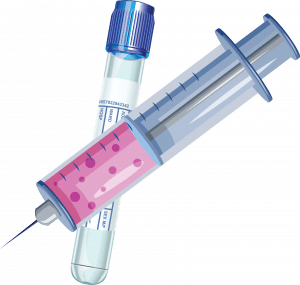

ONCODEcipher Lung Premium
FFPE DNA & blood panel targeting relevant and actionable genes commonly mutated in lung cancer to provide treatment options & prognostic indications.
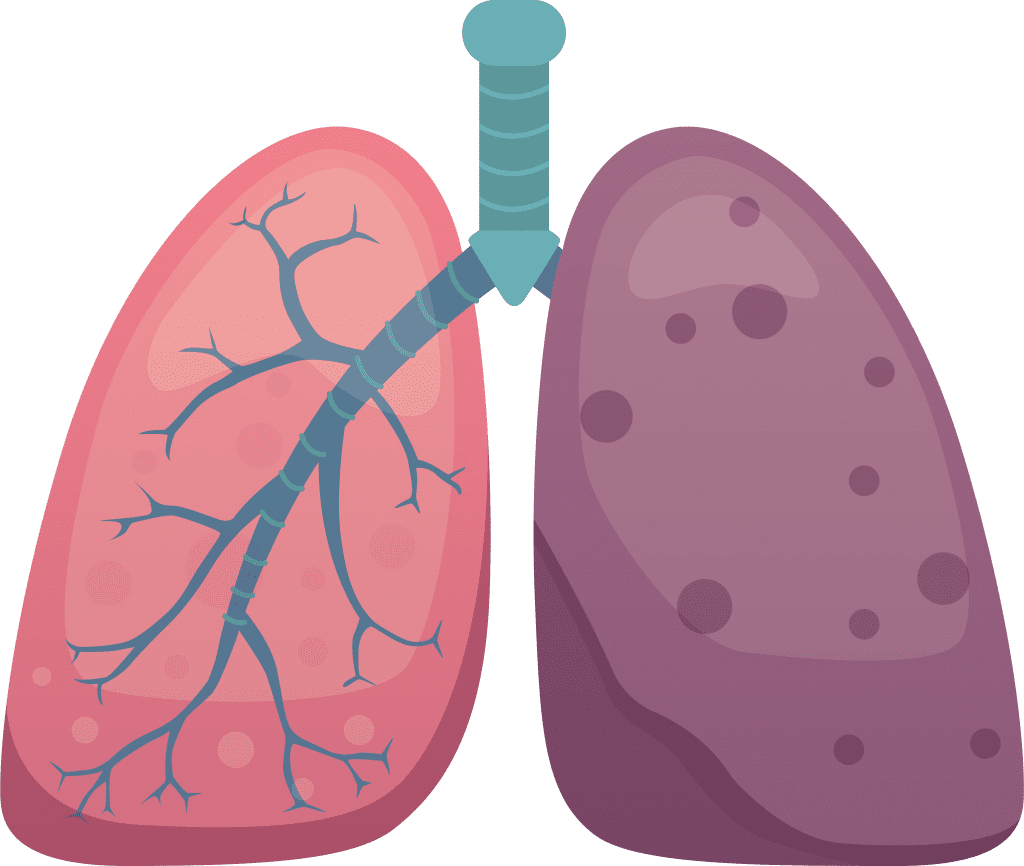

ONCODEcipher Breast & Ovarian Premium
FFPE DNA & blood panel targeting relevant and actionable genes commonly mutated in breast & ovarian cancer to provide treatment options & prognostic indications.
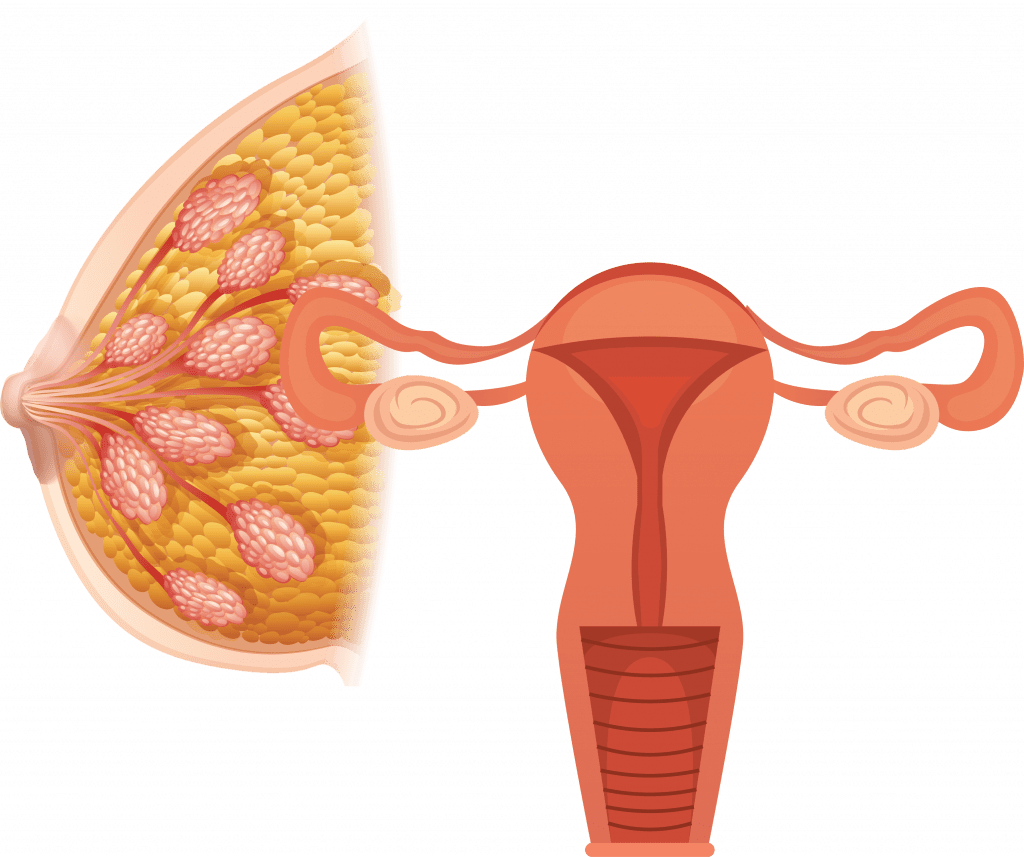

ONCODEcipher Breast & Ovarian Liquid Premium
Non-invasive cell free circulating tumor DNA (ctDNA) panel that delivers information on a variety of treatment/prognosis informative mutations in the genes which are known to play a role in solid tumors using only the blood of the patients.
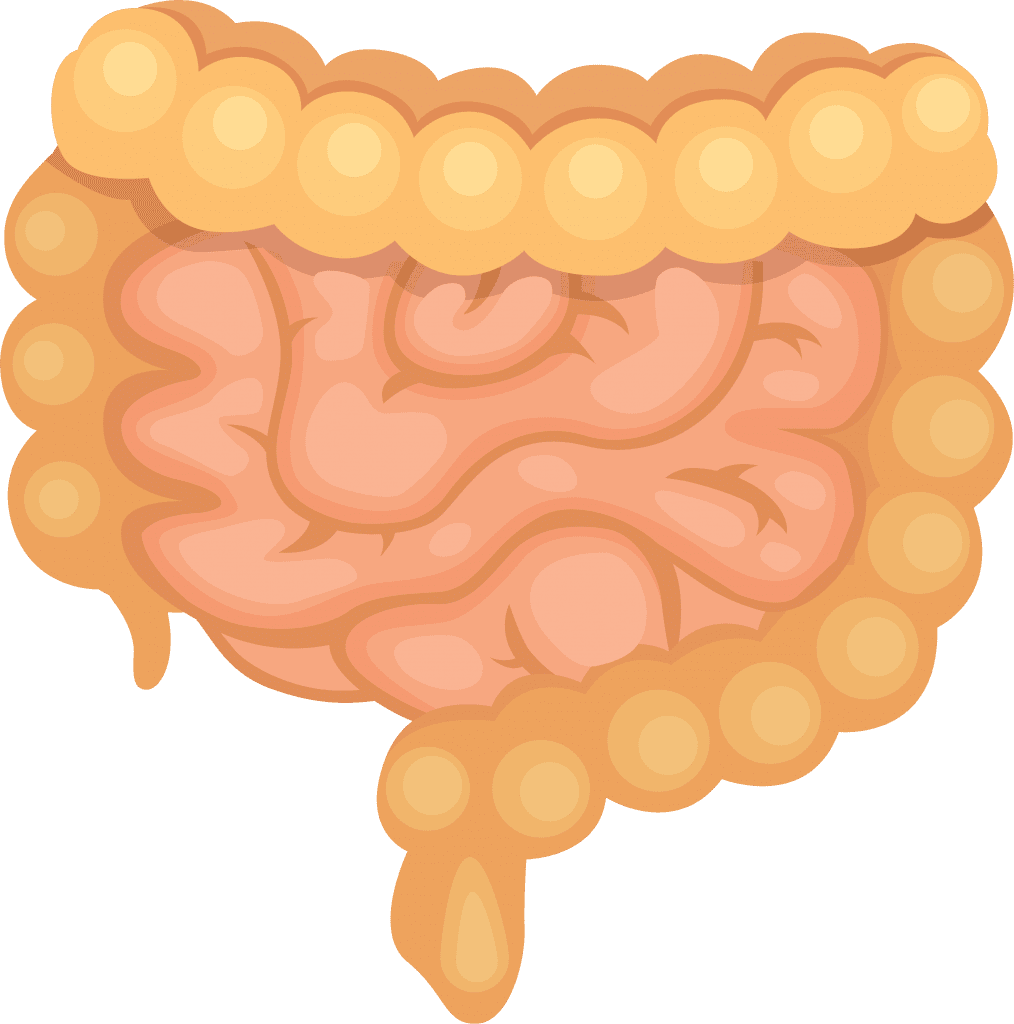

ONCODEcipher Colon & Endometrial Premium
FFPE DNA & blood panel targeting 67 relevant genetic mutations in colon and endometrial cancer AND microsatellite instability (MSI) status to provide treatment options & prognostic indications.
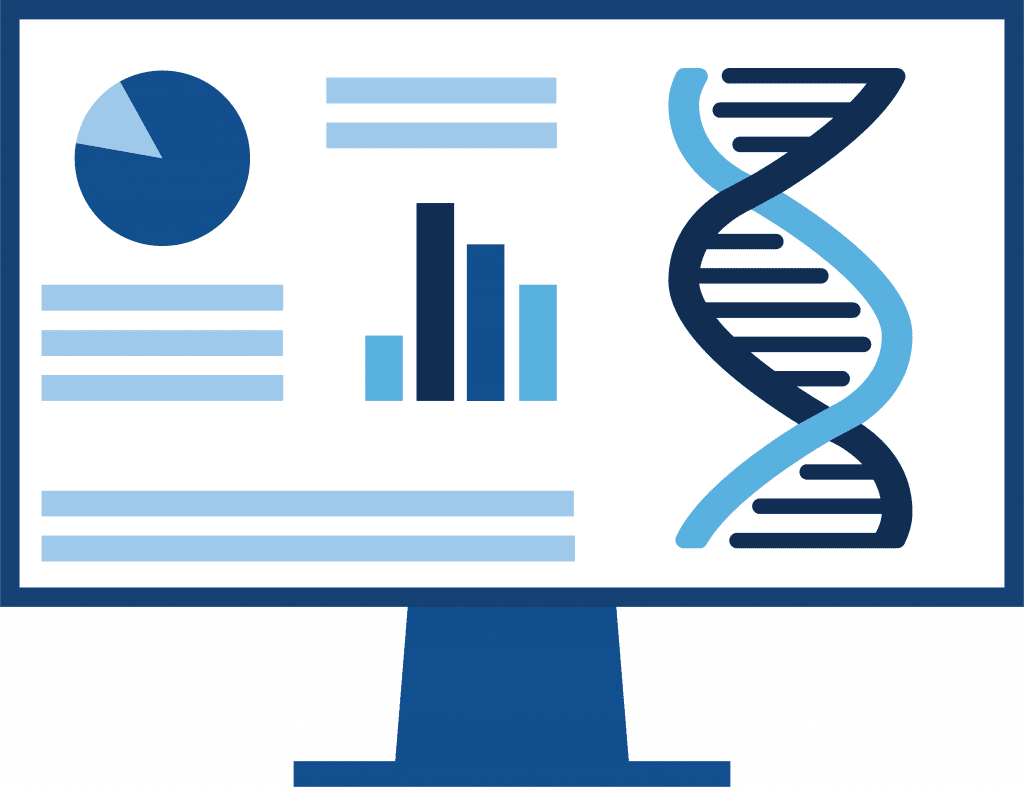

ONCODEcipher Pancreatic & Prostate Premium
FFPE DNA & blood panel targeting relevant and actionable genes commonly mutated in pancreatic and prostate cancer to provide treatment options & prognostic indications.
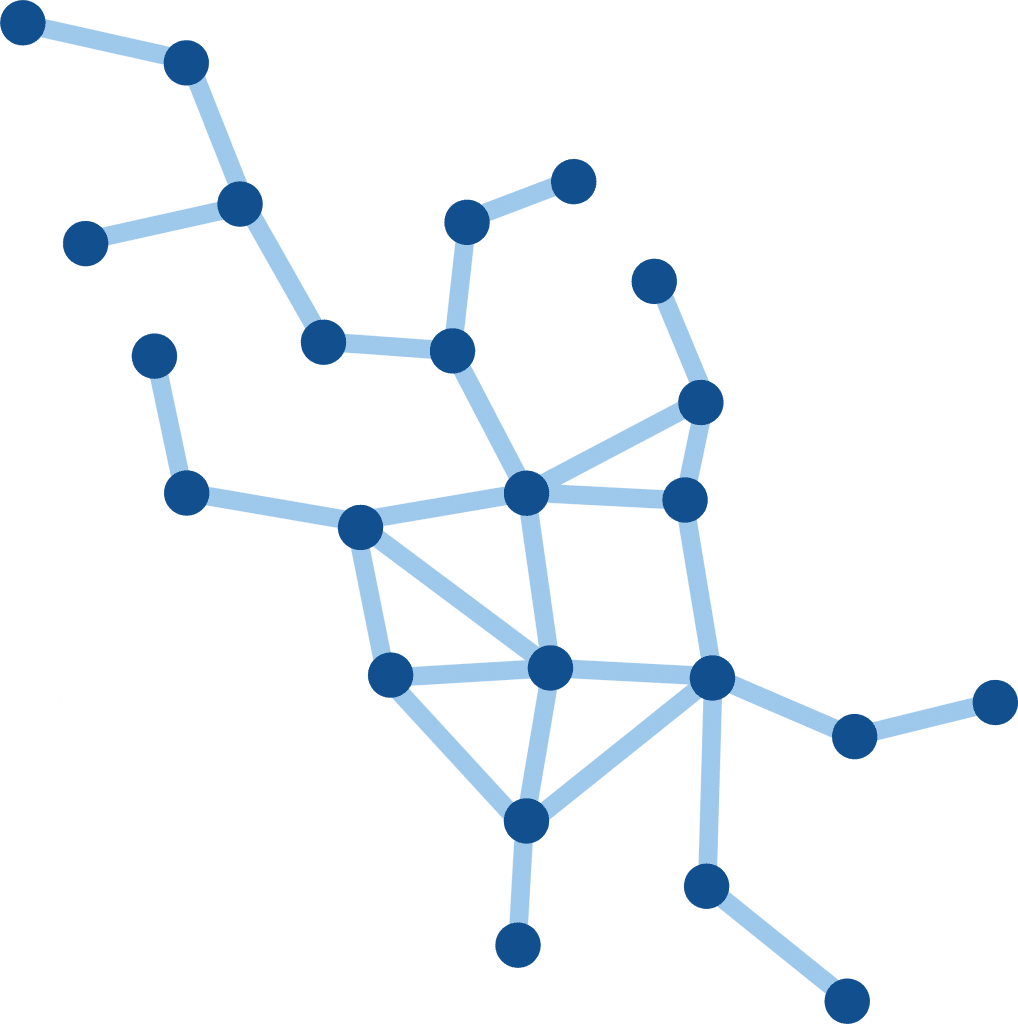

ONCODEcipher Tissue Premium
FFPE DNA & blood panel targeting relevant and actionable genes commonly mutated in cancerous cell tissue to provide treatment options & prognostic indications.


ONCODEcipher Liquid Premium
Non-invasive cell free circulating tumor DNA (ctDNA) panel that delivers information on a variety of treatment/prognosis informative mutations in the genes which are known to play a role in solid tumors using only the blood of the patients.


ONCODEcipher Liquid Premium Plus
Non-invasive cell free circulating tumor DNA (ctDNA) panel that delivers information on a variety of treatment/prognosis informative mutations in the genes which are known to play a role in solid tumors using only the blood of the patients
EOSINOPHILIA
FUSION
NGS panel to detect all fusions/rearrangements in PDGFRA (including FIP1L1::PDGFRA), PDGFRB, FGFR1, BCR, ABL1, FLT3, ETV6 and
JAK2 (including PCM1::JAK2) & mutation in KIT.
MUTATION
37-GENE
NGS panel targeting 37 gene mutations allows a broader exploration of the genes implicated in MPN & AML/MDS.
FUSION
87-GENE
NGS panel targeting 87
gene fusions/ rearrangements implicated in MPN, AML, B-ALL & T-ALL.
AML COMBO PLUS
Comprehensive NGS
panel for AML detecting mutation (23 genes) and
fusion (11 genes)
commonly implicated in AML to provide possible prognostic, therapeutic and diagnostic options.
ABL1 KINASE
DOMAIN
MUTATION
NGS panel designed to detect TKI resistance mutations in ABL1 kinase domain (amino acid positions 244-396)
and all possible BCR::ABL1 fusions.
MPN PCR PANEL
PCR-based test for the detection of mutations in JAK2 V617F & exon 12, CALR, MPL W515K/L/A & S505N.
BRAF V600E
QUALITATIVE
PCR
PCR assay to detect the presence of BRAF V600E variant for assessment of Hairy Cell Leukemia.
MYD88 L265P
QUALITATIVE
PCR
PCR assay to detect the
presence of MYD88 L265P somatic variants for diagnostic of
CD5 negative B-NHL and DLBCL.
For other products & info
How to order
CLINICIANS


step 1
Collection Kit from
Oncode
step 2
Requisition Form
step 3
into EDTA/ Streck
tubes AND/OR
prepare FFPE
slides/block
COURIER


step 4
delivers to Oncode
laboratory at room
temperature
ONCODE


step 5
sample
step 6
accordingly
step 7
reports to clinician
within stated
turnaround time
CLINICIANS


step 8
patient
step 8
treatments and/or
subsequent test
CLINICIANS


step 1
Receive Specimen
Collection Kit from
Oncode
step 2
Requisition Form
step 3
into EDTA/ Streck
tubes AND/OR
prepare FFPE
slides/block
COURIER


step 4
delivers to Oncode
laboratory at room
temperature
ONCODE


step 5
sample
step 6
accordingly
step 7
reports to clinician
within stated
turnaround time
CLINICIANS


step 8
patient
step 9
treatments and/or
subsequent test
For test ordering & additional info
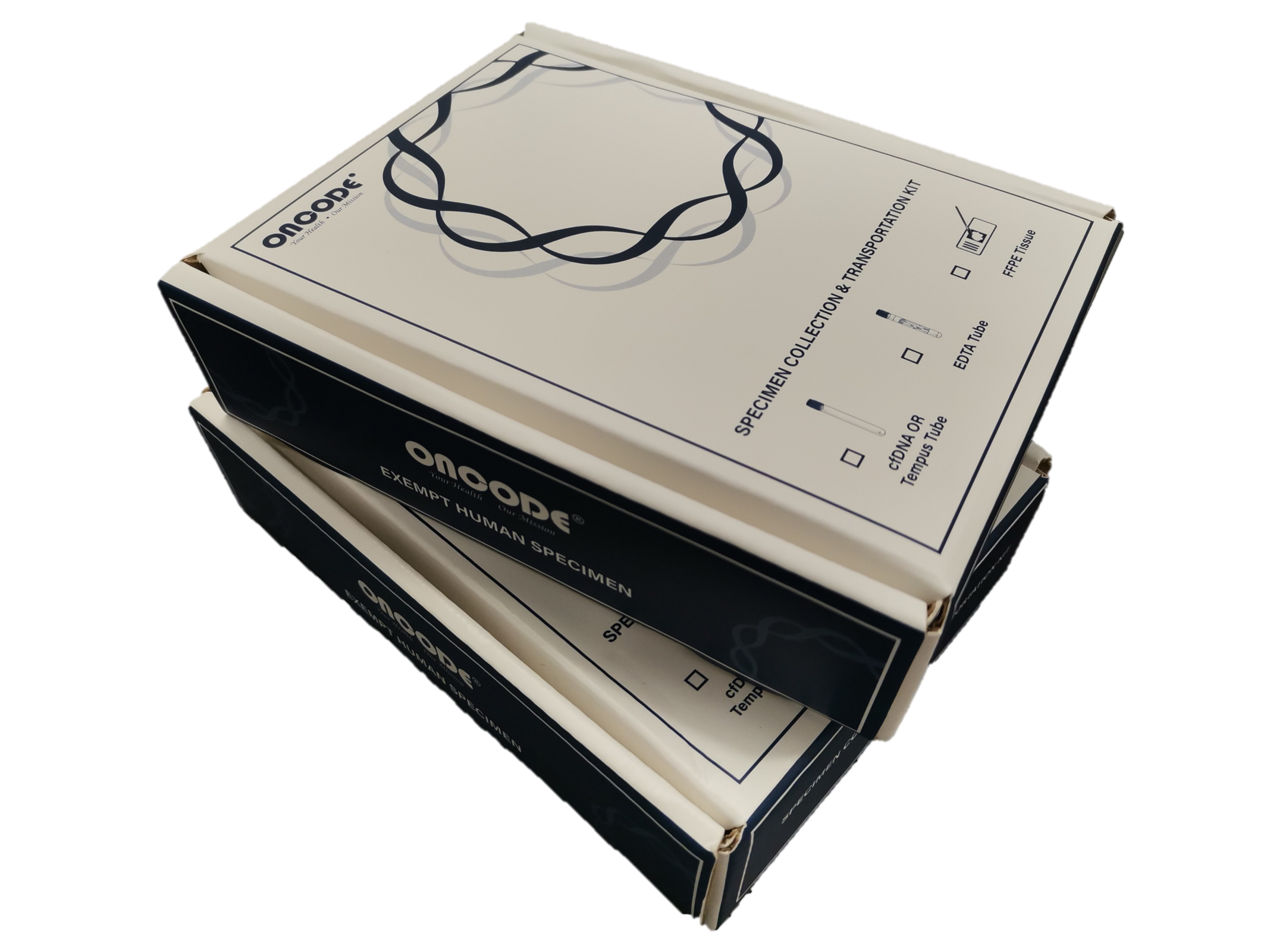

Oncode Specimen Collection Kit containing :
- Specimen collection tube(s) or container(s)
- Test Requisition Form
- Courier form
Kindly fill up Test Requisition Form upon sample pick-up/ delivery. Patient’s pathology reports or clinical reports (if any) can be attached altogether.
FREQUENTLY ASKED QUESTIONS
- Comprehensive panels with high sensitivity: Oncode provide clinicians with a comprehensive range of testing options, including both PCR and NGS tests. These testing options are designed to cater to the individual needs and circumstances, allowing for the selection of the most suitable test. With our rigorous validation and quality control processes, we achieve high sensitivity of up to 99.9% (LOD at 0.1%) and specificity of 100% in all of our NGS tests for every sample tested.
- Exceptional Technical Support: Oncode offers unbeatable technical support throughout the testing process, from test selection to result interpretation. Our team of skilled scientists and physicians is readily available to provide support whenever needed.
- Color-Guided Proprietary Clinical Reports: Oncode’s clinical reports feature a unique color-guided format, providing concise interpretations and direct recommendations for the next steps. This is especially helpful in supporting busy clinicians with their patient treatment planning.
- Thorough Validation and Quality Assurance: Oncode tests undergo comprehensive validation processes, consistently meeting external quality assurance (EAQ) standards such as CAP, EMQN, UKNEQAS, and RCPA through annual enrollments. Additionally, Oncode implements stringent quality controls, checkpoints, and continuous validations as standard practices to ensure the highest levels of accuracy and precision in the tests.
- Outstanding Performance Indicators: Based on past years’ key performance indicators, Oncode achieves a fulfillment rate of 99.7% for all turnaround times, and 99.8% of customer satisfaction surveys rate Oncode as “good” and “excellent.”
- Reasonable Pricing: Oncode offers competitive and reasonable testing price, ensuring accessibility and affordability for customers.
- Knowledge Sharing: Oncode is passionate about sharing knowledge and case studies obtained through our clinical practices. We actively publish these information on social media platforms, participate in exhibitions and conferences, and distribute medical bulletins to disseminate valuable insights and findings.
- Complexity and Coverage: PCR is simpler and easier to perform, but it has limited multiplex capability, meaning it can only analyze a few genes at a time. NGS, on the other hand, allows for simultaneous analysis of many genomic loci, providing a broader coverage of genetic alterations.
- Sensitivity: NGS has a higher sensitivity, often reaching a limit of detection (LOD) as low as 0.1%, while PCR typically has a LOD of around 5%. This means that NGS is more likely to detect low-frequency mutations, while PCR’s lower sensitivity may result in the potential risk of missing well-known actionable mutations, leading to false negatives.
- Technical Demands and Cost: NGS is more technically demanding compared to PCR due to the need for specialized equipment, bioinformatics analysis, and skilled personnel. In terms of cost-effectiveness, NGS becomes more advantageous when analyzing multiple genes. This is because NGS enables the simultaneous analysis of multiple genes in a single test, reducing the overall cost per gene when compared to conducting individual PCR tests for each gene.
- Time and Efficiency: NGS allows for simultaneous analysis of multiple genes, providing all the required data at once. This saves time compared to performing separate PCR tests for each gene of interest. Additionally, NGS avoids the need for multiple biopsies and repeated tests, saving specimen resources.
- Liquid biopsy is a technique used to capture the circulating tumor DNA (ctDNA), which refers to small fragments of DNA released by cancerous cells and tumors into the bloodstream of cancer patients. The analysis of ctDNA has gained increasing importance in clinical practice for several reasons:
- Non-invasive Detection: ctDNA analysis offers a non-invasive alternative to traditional tissue biopsies, providing a more accessible and less burdensome method for obtaining genetic information about tumors. Liquid biopsy is particularly useful in cases where tissue biopsy is not available (when tissue is inaccessible or limited). This has significant implications for early detection, monitoring treatment response, and assessing disease progression.
- Tumor Heterogeneity: Tumors often consist of a heterogeneous population of cells with different genetic alterations. ctDNA provides a representative snapshot of the genetic diversity within a tumor, allowing for a more comprehensive understanding of tumor heterogeneity. This information is crucial for guiding personalized treatment strategies and monitoring the emergence of drug resistance mutations.
- Disease & Treatment Monitoring: ctDNA analysis enables the monitoring of tumor dynamics. It can help track changes in tumor burden, detect minimal residual disease after surgery or treatment, identify disease recurrence earlier than traditional imaging methods, and assess treatment response and the emergence of resistance mutations. This allows for timely intervention and adjustment of treatment plans.
Following the completion of genetic testing, post-testing genetic counseling sessions are conducted to help patients and their families understand the test results and their potential implications for future health. During these sessions, patients can explore strategies for managing their condition and discuss the risk of recurrence of the condition in other family members.
It is important to note that insurance policies can vary between countries and different insurance companies. Therefore, we recommend contacting the local insurance company to ensure that patients are covered and to understand any potential differences in policy.







